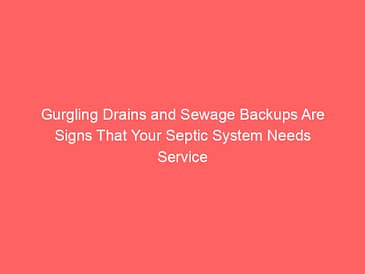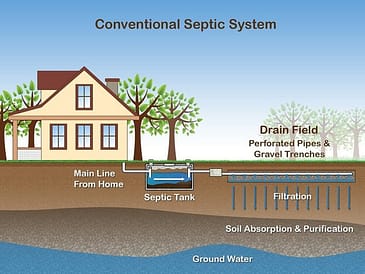Is Septic Tank Repair Covered by Homeowners Insurance? A Homeowner’s Complete Guide
What Is a Septic System, and Why Does It Matter for Your Insurance?
A septic system is an onsite wastewater treatment solution for homes not connected to municipal sewer lines. According to the U.S. Census Bureau, about 21 million American households use septic systems. These systems quietly work beneath the surface, treating household wastewater and returning it safely to the environment.
But when things go wrong, they can get expensive. The National Association of Home Builders notes,
“Replacing a failed septic system can cost anywhere from $3,000 to $20,000 or more, depending on the type and severity of the issue.”
Homeowners Insurance and Septic Tank Repair: The Real Story
The “Dwelling Coverage” Loophole
Most homeowners insurance policies include “dwelling coverage.” This typically protects physical structures attached to your home—including your septic tank and the pipes leading to it—against a list of “covered perils.” These usually include:
- Fire or explosion
- Vandalism or malicious mischief
- Damage from vehicles (other than your own)
- Falling objects (like trees or storm debris)
But here’s the tricky part: If your septic tank is not considered part of your main dwelling, coverage may be limited or nonexistent. It may instead be covered as an “other structure,” which often has lower coverage limits.
What’s Usually NOT Covered
Most insurance policies exclude:
- Wear and tear
- Corrosion or rust
- Tree root invasion
- Earth movement (unless you have earthquake insurance)
- Flooding (unless you buy separate flood insurance)
- Poor maintenance or neglect
- Faulty construction or installation
As Policygenius puts it:
“Insurance covers sudden, accidental damage—not long-term problems caused by age or neglect.”
Real-World Example
Consider the case of the Smith family in rural Ohio. After an unusually heavy storm, their septic tank backed up, flooding their basement. Their standard homeowners insurance policy did not cover the damage. But because they had purchased a special water backup endorsement for $120 a year, their insurer covered $8,000 in cleanup and repair costs.
The Water Backup Endorsement: A Smart Add-On
Most basic homeowners policies do not cover water or sewage backup from outside drains or septic systems. However, you can often purchase a “water backup endorsement”—sometimes called a sewer and sump pump backup rider—for an additional fee.
The Insurance Information Institute notes:
“Water backup coverage is one of the most valuable and affordable endorsements available.”
This small extra premium (often less than $250 per year) can save you thousands if your septic system ever fails.
Septic Tank Insurance Claim Denied: What To Do
Unfortunately, claim denials are common. Insurers often cite neglect, lack of maintenance, or “excluded perils” as reasons.
If your claim is denied:
- Request a written explanation.
- Gather all maintenance records: receipts for pumping, inspection reports, repair invoices.
- Get a second opinion from an independent septic professional.
- File an appeal with your insurer, providing all documentation.
- Contact your state’s insurance regulator if you suspect unfair practices.
As one homeowner shared on an insurance forum:
“I was initially denied coverage for my septic backup, but after submitting receipts for regular maintenance, my insurance paid a portion of the claim.”
How to File a Septic Tank Insurance Claim: Step-by-Step
- Call your insurance company immediately.
- Document the damage with photos and video.
- Don’t start major repairs until the adjuster inspects the damage (unless urgent to prevent further harm).
- Keep all receipts for emergency work or cleanup.
- Get a professional report on the cause of the damage—critical for proving eligibility.
Insurers look for evidence that the damage was sudden and accidental—not due to neglect.
Home Warranty vs. Homeowners Insurance: What’s the Difference for Septic Systems?
Homeowners insurance is designed for unexpected events (fire, accidents, vandalism).
Home warranties cover breakdowns from normal use—and may offer septic system coverage as an optional add-on.
Most home warranty septic plans cover:
- Pumping (once per year)
- Aerator units and pumps
- Line clogs (within the main system)
However, as American Home Shield cautions,
“Home warranty coverage for septic systems is limited and usually excludes drain fields, leach beds, tanks, and damage from roots or flooding.”
Costs of Septic Tank Repair and Replacement
- Minor repairs: $300–$1,200 (broken baffles, cracked lids, minor pipe repairs)
- Full replacement: $3,000–$10,000 (standard system); $15,000–$50,000 for advanced systems (mounds, alternative treatments)
- Backup cleanup: $1,000–$10,000+ (depending on extent and affected areas)
Given these costs, even partial insurance or warranty coverage can be a lifesaver.
Regional Differences: State and Local Regulations
Some states, like Florida and Massachusetts, have strict septic regulations that can affect what’s considered “proper maintenance.”
Tip: Always check local codes, as failure to comply can void your insurance coverage or lead to denied claims.
How to Get Extra Septic Tank Insurance Coverage
- Ask your current insurer about water backup and septic system endorsements.
- Shop around: Some specialty insurers offer broader septic coverage.
- Document everything: Maintenance logs, inspections, and repairs.
As one expert said on Insurance.com:
“Documentation is your best ally in getting claims approved. Insurers want proof the system was well cared for.”
Maintenance: The Best Prevention (and Protection)
- Pump your tank every 3–5 years (or as recommended).
- Annual inspections: Catch small issues before they become big problems.
- Don’t flush anything but toilet paper and waste.
- Keep trees, bushes, and vehicles away from your drain field.
- Install water alarms in basements or areas at risk of backup.
EPA guidance is clear:
“Septic systems that are properly designed, installed, and maintained provide an effective and long-term solution for wastewater treatment.”
Frequently Asked Questions (Expanded)
What’s the difference between a septic tank and a septic system for insurance?
The “septic tank” is the holding and treatment component; the “system” includes the tank, pipes, drain field, and all connected parts. Insurance may treat these differently in terms of coverage.
Can I insure just my septic system?
Some specialty insurance providers offer septic system coverage, often as part of broader “equipment breakdown” or “system protection” policies.
I just bought a house. How can I make sure my septic system is covered?
- Request a septic inspection before closing.
- Ask your insurer about adding a water backup or septic system endorsement.
- Consider a home warranty with septic add-on.
- Keep all inspection and maintenance records.
What if my septic system is old?
Age alone is not a covered peril. However, if it fails due to a covered event (like a tree falling during a storm), you may have coverage—otherwise, you’re responsible for replacement.
Conclusion: Protect Your Home, Plan for the Unexpected
Septic system failures are messy, stressful, and expensive. While homeowners insurance may cover damage in specific scenarios, most repairs are considered preventable and thus excluded.
The keys to peace of mind:
- Understand your policy—know what is (and isn’t) covered.
- Invest in maintenance—keep records and schedule regular pump-outs.
- Consider extra endorsements—like water backup or septic coverage.
- Ask questions—your insurance agent is your ally.
As one industry expert summarizes:
“Homeowners insurance is there for the unexpected. Maintenance is your responsibility, but smart coverage decisions can save you thousands.”
Disclaimer: This article is for informational purposes only and does not constitute legal, insurance, or financial advice. For advice specific to your situation, consult your insurance provider or a licensed professional.





